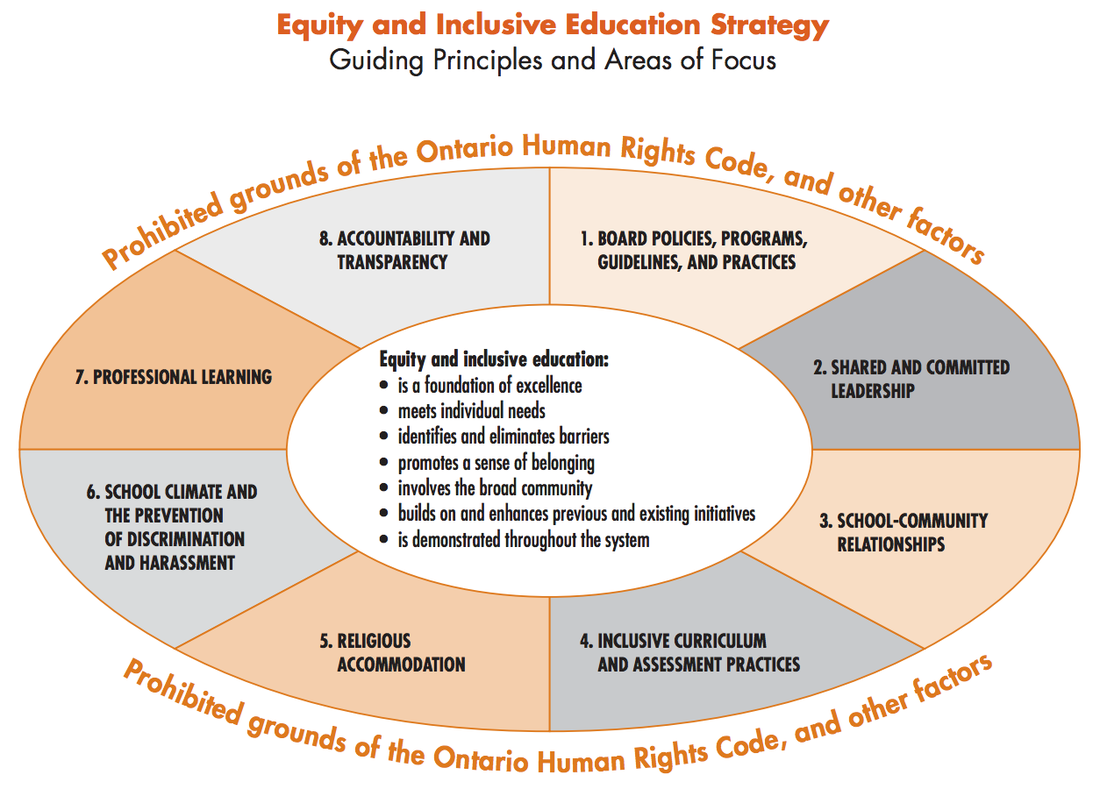 The image posted above comes from the Ontario Ministry of Education’s “Equity and Inclusive Education in Ontario School Guidelines for Policy Development and Implementation” document.
Inclusivity is, as far as I'm concerned, a non-negotiable issue in the education system. I don't think there is any reasonable argument that would indicate that certain people should not be included in school systems, schools, boards, classes, etc.
Equity, however, is a challenging term. In order to make any headway on the equity issue, we must agree on the meaning. Dictionary.com defines equity as "the quality of being fair or impartial."
As I see it, there are two main challenges with equity.
The first challenge with equity is that fairness does not mean equality or sameness. Many people will object that certain actions or decisions are not equitable because they are different. Difference can be equitable. Consider the following: You are given the opportunity to go on an overseas mission trip for 2 weeks in the summer. It will cost $2500. Your older sibling is planning a camping trip with his/her friends for 2 weeks in the summer. It will cost $200. Is it equitable for your parents to send both you and your sibling on your respective trips? Of course. At this moment in time you have a need for $2500 and your sibling has a need for $200. In providing both you and your sibling with the funds for your trips, your parents are behaving in an equitable manner.
The second challenge with equity is that we work in a highly subjective and relational profession where, I would argue, it is impossible to be impartial. This is a challenge that I'm not sure how to get around. We can - as much as possible - attempt to make decisions for our students in an objective and impartial way . . . however, we are human. Our students are human. We have relationships with our students. The connections we have differ. I think the best way to attempt to be equitable is to at least acknowledge that we are not impartial. Admiting the problem is the first step, right?
 I didn't set out to get myself hooked on Pinterest. In fact, all I wanted to do really was see if someone had a neat idea or activity to use for teaching demonstrative adjectives in French.
A quick Google search brought me to a number of different Pinterest sites. Before I knew it, I had spent over an hour scrolling through a number of Pinterest sites, reading some of the inspirational quotes and jotting down a few of the activity ideas. Then I realized my jot notes on scrap paper were silly. How much easier would it be just to click "Pin It"?!
Pinterest, like Twitter, is all about sharing information. In fact, when you first join, the program asks you to choose 5 people to follow - just to get you started. I can see how this program - once again, like Twitter, - could easily become addictive. There is a wealth of knowledge presented in an interesting way, and I don't even have to go searching for it. Someone with similar interests to mine has probably already pinned a whole bunch of ideas, websites, and images that I would likely want to look for.
The next step is bringing it to the classroom. I can see the possibility of having students use Pinterest to collect and submit an annotated bibliography of sorts on a given topic. Students could gather a number of pictures and links that all help to support their thinking about a topic and then provide comments on each image. The challenge and the reward of a site like Pinterest is its public nature. It's great for sharing ideas and resources. It's challenging for maintaining privacy of students. Perhaps we could have a class Pinterest where students can all log in to the same site and make modifications to a board there. That way no names, e-mails, etc. would have to be shared.
I'm excited about the possibilities.
 Yesterday I attended my very first edcamp.
Whoa.
Who knew that there were so many eager teachers willing to give up a Saturday to meet with people they don't even know and have challenging and invigorating conversations about education?!
I can't even describe the energy at Ancaster Senior Public School yesterday morning. It was frenetic. And I was a part of it.
I was excited about going - mostly just to see what it was like. But I would be lying if I didn't say I was a bit skeptical at how the day would actually run. No set topics. No speakers. Pretty much a free for all.
I surprised myself at how much I actually participated in the conversations that were going on. I often felt like I had something to add to the conversation, and I was engaged in the discussions happening.
Digital Citizenship - I loved hearing what @acampbell99 had to say. His comments mirror my own thinking exactly. He was adamant that we shouldn't be talking so much about digital citizenship. Instead, we should just be worrying about citizenship. Online or offline - it's the same thing.
Gamification - There were some really interesting ideas shared here about teachers being game-makers. I enjoyed @gisforgonzalo 's idea that all you need for a game to happen is a couple of rules. Any time we implement an activity in the classroom that has a goal and some parameters, we have a game. My question then is, how do we ensure that our game is going to capitalize on student success?
Inquiry-based Learning - Thanks to @peterskillen for sharing some of his knowledge and expertise surrounding inquiry-based, problem-based, project-based, and tinkering-based learning. We had some rich discussions in this session about what inquiry-based learning may look like in the classroom (particularly outside of Science). I enjoyed hearing my colleagues thoughts about scaffolding learning as well. Are we truly sc
The most exciting part of edcamp: I have 3 new Twitter followers! :)
One of the only activities that happens in my classroom right now that is device-less is portfolio reflection. All the students have a file folder and notebook that sit in a filing box in the classroom. Each time they get an assessment piece returned to them, it gets added to the portfolio, and the students spend some time reflecting on their progress and making goals for the future.
I've often wondered what the easiest method would be for getting this to go digital.
I think for some students, it may not. Some students do prefer to have paper and pencil - and that's okay.
But for others, I'm looking at different ways to make an electronic version of this work.
A brief Google search for e-portfolios is going to lead you toward Weebly. Well, sounds good to me - I'm already using Weebly, and so are my students! Seems like it could be an easy transition.
I've been reminded this weekend of some of the challenges that come with technology.
A number of our students have discovered a "trolling" site where they can post and answer anonymous questions to others. It's become a treasure trove of inappropriate language, exclusion practices, and hateful propaganda. And, to be honest, having it brought to my attention and reading through many of the comments my students have made has really shaken me.
A large part of integrating technology into the classroom is providing students with the opportunity to learn how to use the technology effectively and productively. I want my students to be good digital citizens. Actually, what I want is for my students to be good citizens . . . and I want those behaviours to stretch online as well.
In the aftermath of the Ask.fm fiasco, my students and I have had many conversations about the public nature of posting on the internet, the permanent nature of posting on the internet, and the fact that it seems so easy to write something down on the internet even when one would never say it aloud. We've discussed what it means to have an online presence and how our online persona tells others about the type of people we are.
It's been a rough week for me. And a learning experience for us all.
I joined Twitter about 3 months ago. I did it mostly just to see what it was all about. People are always talking about twitter this and twitter that, tweet this and tweet that. I felt like I was missing out. I was. And I wasn't. I have come to enjoy the 15 minutes I have added to my before-bedtime ritual as I glance over the latest tweets of the few educational gurus I'm following. Twitter has provided me with yet another way to have lots of information at my fingertips. The difficult I've been having with Twitter is decided what to tweet myself. Who could possibly care what I have to say? So I've been quietly consuming the ideas of others over the past few months. And I've been having fun doing that. But it's time to step it up a notch. My colleagues and I were planning a trip with our students to see Rob Stewart's new documentary, Revolution. The film has its own Twitter account. That knowledge was enough to get my mind rolling. How could we get the students connected to this movie and the message in it? How could we get the students talking with each other, both within their respective classes and between classes? How could we let Rob Stewart, the film's young director, know that we are supporting him and his cause? The answer to all these questions was one simple word: Twitter. So that's been our (my colleagues and I) challenge for the week.
All our students received written permission from their parents to sign up for Twitter. They've all created an "educational" account . . . we talked about what the difference might be between a personal account and a school account. And today they started tweeting. It's been crazy! And fun! The studen
The students (and I) are still learning, but we're engaged, motivated, and conversing in a meaningful way.
Recognizing that instruction should stem from assessment is not a new concept, nor should it be. It seems quite obvious to me that your knowledge of your students, their abilities, their background knowledge and understanding of concepts, and their readiness to learn should all factor into your day-to-day plans.
My elementary school teachers - for the most part - were the opposite of forward-thinking. Perhaps that's not a fair statement . . . it was 20ish years ago. Nevertheless, my teachers cared very much about their thematic bulletin boards, their science fair projects, and their spelling tests. They didn't always care about what was best for their students.
But I can remember one instance in Grade 7 when my teacher did something radical. We'd done a whole (text-book based) math unit on decimals and percents. And then we'd written a test. And the majority of the class failed the test. Instead of moving on to the next unit, our teacher announced that we were going to be doing something a little different. She was going to re-teach the unit for those who had had trouble using different examples and different practice questions. Meanwhile, the group of 6-8 of us who had been successful with percents were going to work independently on a problem-based rich task throughout the week.
As a student, this is one of the most memorable moments of my Grade 7 year. I thought my teacher was so cool for spending the extra time to ensure everyone knew what they were doing while challenging the rest of us with something new.
As a teacher, I recognize the radical quality of this decision (it was the mid 1990s after all) and applaud my teacher for her creative and wise idea.
Students aren't put first if we ignore their challenges.
Students aren't put first if we encourage disengagement.
Yes, the data we collect in our classrooms tells the students how they are progressing. However, more importantly, that data informs US about how the students are progressing, about the effectiveness of our instruction, and about where we should be headed tomorrow and the day after and the day after that.
|



 RSS Feed
RSS Feed